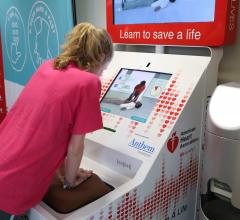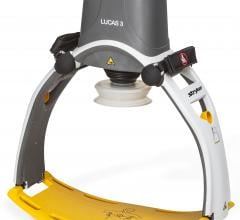March 7, 2013 — Experts from The Children's Hospital of Philadelphia were among the leaders of two large national studies showing that extending cardiopulmonary resuscitation (CPR) longer than previously thought useful saves lives in both children and adults. The research teams analyzed the impact of CPR duration in patients who suffered cardiac arrest while hospitalized.
"These findings about the duration of CPR are game-changing, and we hope these results will rapidly affect hospital practice," said Robert A. Berg, M.D., chief of critical care medicine at The Children's Hospital of Philadelphia. Berg is the chair of the scientific advisory board of the American Heart Association's Get With Guidelines-Resuscitation program (GWTG-R). That quality improvement program is the only national registry that tracks and analyzes resuscitation of patients after in-hospital cardiac arrests.
The investigators reported data from the GWTG-R registry of CPR outcomes in thousands of North American hospital patients in two landmark studies — one in children, published in January 2013, the other in adults, published in October 2012.
Berg was a co-author of the pediatric study, appearing online in Circulation, which analyzed hospital records of 3,419 children in the United States and Canada from 2000 through 2009. This study, whose first author was Renee I. Matos, M.D., M.P.H., a mentored young investigator, found that among children who suffered in-hospital cardiac arrest, more children than expected survived after prolonged CPR, defined as CPR lasting longer than 35 minutes. Of those children who survived prolonged CPR, more than 60 percent had good neurologic outcomes.
The conventional thinking has been that CPR is futile after 20 minutes, but Berg said these results challenge that assumption.
In addition to Berg, two other co-authors are critical care and resuscitation science specialists at The Children's Hospital of Philadelphia: Vinay M. Nadkarni, M.D., and Peter A. Meaney, M.D., M.P.H.
Nadkarni noted that illness categories affected outcomes, with children hospitalized for cardiac surgery having better survival and neurological outcomes than children in all other patient groups.
The overall pediatric results paralleled those found in the adult study of 64,000 patients with in-hospital cardiac arrests between 2000 and 2008. Berg also was a co-author of that GWTG-R study, published in The Lancet on Oct. 27 and led by Brahmajee K. Nallamothu, M.D., M.P.H., of the University of Michigan. Patients at hospitals in the top quartile of median CPR duration (25 minutes) had a 12 percent higher chance of surviving cardiac arrest, compared to patients at hospitals in the bottom quartile of median CPR duration (16 minutes). Survivors of prolonged CPR had similar neurological outcomes to those who survived after shorter CPR efforts.
The American Heart Association and American Stroke Association designated the adult study as the top finding of the year in heart disease and stroke research in its annual list of major advances. Next steps for CPR researchers are to identify important risk and predictive factors that determine which patients may benefit most from prolonged CPR, and when CPR efforts have become futile.
"Taken together, the adult and pediatric results present a clear and hopeful message: persisting longer with CPR can offer better results than previously believed possible," concluded Berg.
For more information: www.chop.edu

 April 02, 2019
April 02, 2019 



